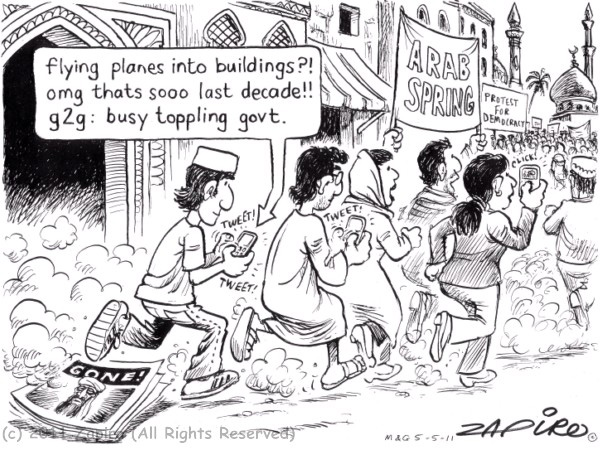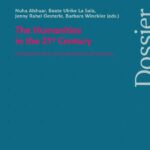Transcript of my speech presented at the University of Western Australia
click here for details of the event UWA Panel
Abstract: The presentation will seek to argue that while Osama Bin Laden and Egyptian society shared two similar key goals: end to oppressive dictatorship and US meddling in the region. It was Bin Laden who lost considerable legitimacy on Egypt’s streets prior to and, more significantly, as a result of the 2011 Egyptian Revolution. Mubarak’s Egypt was central to Bin Laden’s narrative of repression and political revolution in the Arab world, ideologically underpinned by his deputy, Egyptian physician, Ayman Al Zawahiri. Three main dynamics came into play to sideline an already waning Al-Qaida narrative: the opening of an alternative route of political and social dissent; the growing Al-Qaida-Egyptian Islamist divide as well as the latter’s political maturation; and, critically, societal perception shifts vis-à-vis the burden of responsibility in the ruler-ruled paradigm.
The morning Egypt woke up to Osama Bin Laden’s death, I witnessed a mixed bag of reactions in Alexandria. I found a heart-broken lady, an indifferent uncle, a relieved taxi driver, and a public servant with Salafi leanings who, interestingly, was not as angry as he was dismissive of Bin Laden as a creation of America. That same week on a Friday afternoon, I travelled to Tahrir Square in Cairo and came across a middle aged man selling Bin Laden souvenirs. The same day, a few hundred Salafis marched to the US Embassy, protesting the death of the former Al-Qaida leader. In the bigger scheme of political commotion taking place, which included youth led protests demanding trials of all former regime elements, groups seeking an end to the emergency law, to the Pan-Arab variety rallying the masses for the Third Palestinian Intifada on the 15th of May. In this chaotic picture of revolutionary chatter, Bin Laden barely registered a blip on the socio-political radar.
Following the 911 attacks, Egypt found itself in the international spotlight, not far behind Saudi Arabia and Pakistan, due to the Egyptian connection of Bin Laden’s deputy, Ayman Al Zawahiri, 911 lead hijacker, Mohammed Atta, and Egypt’s intellectual foundations for radical Islamism, particularly those of Sayyid Qutb.
For Egypt was the jewel in the crown in the Al-Qaida story. Egypt was the intellectual nucleus of Sunni Islam; the incubator of Arab cultural trends and political thought; with the Arab world’s largest military.
But Egypt equally represented something sinister to Al-Qaeda; the darkness of Egypt’s prison system, where the regime’s oppression and torture radicalised a generation and gave birth to several terrorist offshoots. Pulitzer Prize winning author, of the Looming Tower, Lawrence Wright, states, “to understand Egyptian prisons is to understand the root of Islamic terror.”
But I would also like to paraphrase that and say: to understand regime oppression and Islamist terror is to understand the root of the popular Egyptian response. Which came in the form of non-violent political and social dissent in the revolution, the relative maturation of Islamist groups, and shift in perceptions that redefined the citizen in the ruler-ruled equation.
Following Bin-Laden’s death, the Muslim Brotherhood condemned the act as an assassination, stating that he should have been put on trial instead. But they also stated that Bin Laden did not represent Islam. A Salafi cleric in Alexandria remarked that Bin Laden “was killed with his head held high, and God did not hand him over to his enemies”. Apart from this, Egypt’s Islamists quickly moved onto other pressing matters.
In his book The Bitter Harvest, Zawahiri attacks the Muslim Brotherhood for renouncing the use of violence against the Hosni Mubarak regime and by contaminating itself for daring to enter mainstream politics.
Egypt’s Islamism presented the public with several feasible voices, not just the violent marginal kind. While still somewhat divisive, the Muslim Brotherhood since renouncing violence in the 1970s, was able to act as a viable alternative to violent extremism. With the process of time, they became more reminiscent of Europe’s Christian democrats than the US Evangelical Right. They’ve also learnt to speak the language of the street than the grandiose Caliphate utopia heard by the Al-Qaeda types. To give one example; over a month ago I attended an unprecedented public debate between Amr Hamzawy, an intellectual who was promoting a secular liberal democracy, and the Muslim Brotherhood’s senior official, Sobhi Saleh.
What intrigued me was the clean-shaven Saleh who started off on religious arguments, towards the end in his final statements, moved on to appeal to nationalist sentiments. He raised Egypt’s ancient glory of the Pharaohs, to its central role in world history and trade. These patriotic statements elicited an exuberant reaction from the audience. I felt the Islamic group was one step short of renaming itself to the Egyptian Brotherhood.
Many observers worry that Bin-Laden’s inheritors will make significant inroads into post-Mubarak Egypt, and analogies are often drawn to 1979 Iran, but this is a dubious comparison. It must be stated that economic factors drive political imperatives. Unlike oil exporting states that do not require the goodwill of the international community to sell its oil, Egypt does not have the same luxury, and maybe for good reason too.
As the tourism industry is Egypt’s lifeblood – the country’s image is paramount in order to attract tourists. Therefore self-sufficiency is not an option for Egyptian Islamists if they decided to enact ultra-conservative laws. A national income that depends on tourism, Suez Canal revenue, Gulf investments, US Aid, cotton exports and other trade; propels Egypt into the world’s inter-connectivity of economic and social networks. Islamists will show themselves to be more pragmatic than we may have first thought.
In a recent Poll, 75 per cent of people polled were positive about the Muslim Brotherhood, yet only 17 per cent want them to lead the next government. Pragmatism cuts both ways.
What is more, the undermining of the Al-Qaida narrative came in the form of Turkey. To Egyptian Islamic groups, here was a dynamic, democratic and economically successful Muslim Sunni majority state, headed by the Islamic Justice and Development Party. Shiite Iran, which galvanised Islamist groups in the early 1980s, now isolated and reactionary, does not look as appealing anymore.
The Egyptian Revolution cracked open an alternative form of political and social dissent, where people rallied not in the name of faith, but in opposition to tyranny. The protesters were no different from reform movements commonly seen around the world. Al-Qaida’s bitterly anti-democratic credentials were at odds with the protesters demands. Muslim frustration about government corruption and brutality was often the lynchpin for Al-Qaida. However, a Peaceful revolution, at least from the protesters side, weakened the Bin Laden stance that change will only come about through violence.
Mohamed Salmawy, an editor at Al-Ahram newspaper, stated that “Before Jan. 25 Osama was very relevant. He led resistance to the world order. America was the ally of Mubarak, so bin Laden was the man who challenged that order. After Jan. 25 he was no longer relevant—the people themselves had challenged the order”.
I want to finally move onto the shifting of Egyptian perceptions. Observing Egyptian talk show topics over the last decade, one notices a common question being asked, how did countries like India, China, and Brazil move ahead in the world and Egypt was left behind? There was soul searching in the public, all the while, Bin Laden certainly did not have the answers. The hard questions were channelled through the likes of Muslim preacher Amr Khalid, which the Sydney Morning Herald labelled as the anti-Osama, whose focus was on bringing about an Arab cultural renaissance.
Terminology was redefined. Shaheed, or martyr, took on a new meaning. No longer was it a suicide bomber, mujahedeen, or anyone fighting the West and Israel. But it now came to encompass an ordinary everyday Egyptian who dies at the hands of the regime. This was seen with the death of Khaled Saeed, the young Alexandrian who died exactly a year ago this week. Neither a political activist nor a religious radical, Saeed, along with over 800 Egyptians who died later in the Revolution, were the new martyrs.
Such perception shifts are significant in a country where conspiracy theories are a dominant political language, which often lead to disempowerment and complacency. One of the outcomes was that the citizen can and should shoulder the burden of responsibility if change was to be enacted.
A Pew research found that 22 percent of Egyptian Muslims had confidence in Bin Laden. Now this is certainly a dramatic drop from a decade ago that showed Bin Laden’s favourability to be past the 50 mark. Yet one might argue that 22 percent out of 84 million, or 74 million Muslims to be exact, is a disturbing figure.
But on closer inspection, there appears to be a misreading of Bin Laden’s role. Those I interviewed, which included secular Muslims, looked upon the former Al-Qaida leader as an anti-imperialist, rather than a model Muslim. Anti-imperialism has no Quranic connotation and is mainly linked to the geopolitics of the region, in which the discourse is more flexible than if it had been underpinned by ideological stubbornness.
The fraudulent parliamentary elections last December that swept in Mubarak’s NDP, extinguished all hope that reform can be made from within the system. This is one point where Bin-Laden and Egyptians could agree upon. The final nail in the coffin for Islamist terrorism and the regime came with the bombing of a Coptic church in Alexandria on New Year’s Day.
Many Egyptians I spoke with, Muslims and especially Coptic Christians, believe that the then infamous interior minister, Habib Al-Adly, had a hand in the operation. Whether Al-Adly was involved or not is irrelevant, the point is that they believe he was, and that perception would shape a critical insight: That the regime cannot protect the people (And in some cases harm it), and that radical Islamism cannot act as a conduit for better change.
This perception would lay the groundwork for the religious and national unity displayed later on that same month in Tahrir Square. All the ingredients were there, and the spark that ignited the uprising was the overthrow of the Tunisian President Zine El Abidine Ben Ali in mid-January. For Egypt, and the Arab world, the psychological barrier had been broken that an Arab leader no longer needs to die in office, but can now be sent on a one-way ticket to Saudi Arabia, or Sharm El-Sheikh.
Furthermore, social media enabled mass amplification and propagation of perceptions. With social media, the youth were able to help ignite, galvanise, mobilise and globalise the revolution. All the while, radical Islamism was left behind, rehearsing the same tired script.
A sense of empowerment has swept through Egypt. The hundreds of Egyptians I spoke with are distressed by the devastated economy and recent sectarian clashes, yet the majority are optimistic about the future.
Mubarak’s Egypt was central to Bin Laden’s narrative of repression and political revolution in the Arab world. Yet those grounds have been severely shaken.
The young Egyptians who overthrew Mubarak were more effective in 18 days of non-violent protest than Bin Laden had been in 18 horrifying years of murder and mayhem since the first World Trade Centre bombing in 1993.







